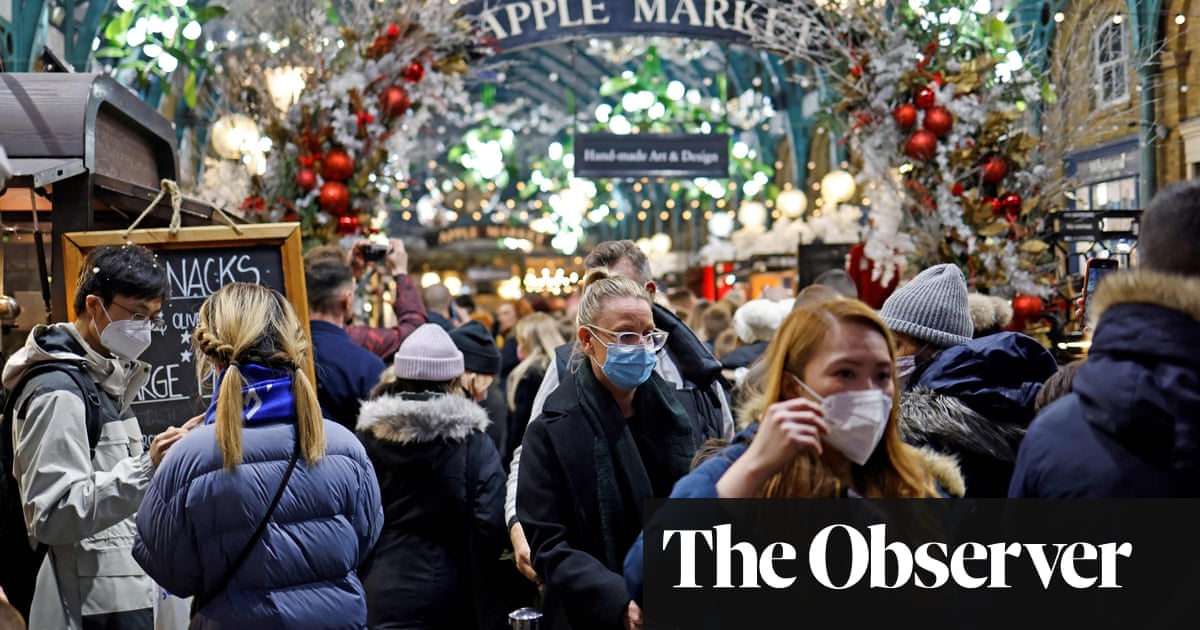
The scale of the threat posed by the Omicron variant was laid bare by government scientists last night as they warned that there are now hundreds of thousands of infections every day. That daily number could reach between 600,000 and 2 million by the end of the month if new restrictions are not brought in immediately.
The government’s SPI-M-O group of scientists, which reports to the Scientific Advisory Group for Emergencies (Sage), also warned that, based on their modelling, hospitalisations could peak between 3,000 and 10,000 a day and deaths at between 600 and 6,000 a day.
Sage urged the government to reintroduce “more stringent measures … very soon”. The minutes of its meeting on Thursday stated: “The timing of such measures is crucial. Delaying until 2022 would greatly reduce the effectiveness of such interventions and make it less likely that these would prevent considerable pressure on health and care settings.”
The advisers suggested reintroducing measures “equivalent to those in place after step 2 or step 1 of the roadmap in England”. Rules at that time included the “rule of six” and just two households meeting; they also barred holidays abroad, while care-home residents were allowed only one regular visitor.
“Although increased vaccination is a critically important mitigation and will reduce disease severity,” the minutes stated, “a significant package of non-pharmaceutical interventions would be required to slow growth in infections. Crowded indoor mixing with many different groups remains the biggest risk factor for spread. Large gatherings present a risk for multiple spreading events.”
Boris Johnson has so far resisted imposing further measures after a major rebellion against “plan B” measures last week, when 100 of his MPs opposed him. Since then, Tories have also criticised England’s chief medical officer, Chris Whitty, for advising people to scale back their Christmas plans. Whitehall officials said there were no plans for an announcement on further Covid measures.
As well as the alarming scenarios above, Sage also modelled the impact of measures imposed under step 1 of the roadmap used last spring. If step 1 measures were imposed, the modelling suggested that infections could be limited to between 200,000 and a million a day. Hospitalisations could run at between 1,500 and 5,000 admissions a day and daily deaths would be 200 to 2,000.
Ministers have also been warned that rising cases and increasing reliance on testing could see demand for tests outstrip supply, while airborne transmission of Covid beyond two metres may happen more frequently.
A scientific paper published on Saturday also suggested it may be necessary to reconsider the wearing of face coverings in places where the balance of risks and benefits did not previously support it, such as primary school classrooms. It added that many face coverings, such as scarves, other single-layer fabrics and valved masks are likely to be ineffective at reducing transmission.
This came as a major incident was declared in London, after a series of concerns were raised about the number of NHS staff off sick or self-isolating with Covid. London mayor Sadiq Khan made the announcement after seeing the number of cases in London increase rapidly. He said in the past week, the number of Covid patients in London hospitals has gone up 29%.
Ed Davey, the Lib Dem leader, demanded a recall of parliament. “We cannot allow the prime minister to sit on his hands while the NHS and businesses are on the brink of collapse,” he said. “Ministers must explain the latest scientific advice to MPs and ensure a proper debate over future Covid measures, including support to help businesses through this increasingly difficult period.”
Johnson now faces cross-party calls to ignore rebels in his own party and take action, bringing in the additional measures with Labour support if necessary. Dan Poulter, a Tory MP and NHS hospital doctor, said: “We should recognise that we have a variant of serious concern that’s causing an increased number of cases, and put those measures in place sooner rather than later and follow the science. I’m afraid I find the thinking of some of my colleagues highly irrational and muddled at times. I hope the prime minister will listen to the scientists and the medics on the frontline who are seeing the real impact of this pandemic.”
Shadow health secretary Wes Streeting said: “Boris Johnson cannot allow his weakened authority within his party to prevent him from taking the decisions that might be necessary to protect public health. He may no longer be able to rely on the votes of his own MPs, but Labour’s message to the prime minister and the health secretary is that we stand ready to do what is right in the national interest.”
Across Europe, governments are reimposing stricter measures. Dutch prime minister Mark Rutte on Saturday night announced the Netherlands will go into lockdown from Sunday morning. France conceded that the variant was “spreading at lightning speed” throughout Europe and would become dominant in the country by the start of next year. Separately, Italy said it was tracking a “strong acceleration” of Omicron cases.
The danger facing Britain was also stressed by UK scientists yesterday. “We now have an uncontrolled outbreak in the UK,” said Michael Head, senior research fellow in global health at Southampton University. “It makes a huge amount of public health sense to now implement further restrictions.
“However, the politics has become ugly. The prime minister’s denials around the multiple Christmas parties that clearly happened are a little pathetic and we also have the mendacious undermining of the pandemic response for political gain by several of his more vocal, but ignorant, MPs. The government is in a great mess, at a time when strong leadership and collective voices are crucial.”
This point was backed by Prof James Naismith, of the Rosalind Franklin Institute, Oxford. “Parliament has effectively decided to rely on hope by not imposing restrictions early. If that hope is wrong, we will know around Christmas Day, when – most likely – it will be too late to stop fairly significant adverse consequences in addition to disruption. It would also suggest that, as the Peter Cooke joke runs, we have learned from our mistakes … in order to repeat them.”
Virus expert Stephen Griffin of Leeds University also warned that the government appeared to be ignoring the advice of the WHO, parliamentary committees and Sage to act in a timely fashion. “This is a repetition of past failings, and all the more frustrating and upsetting as potential mitigations could now be intrinsically linked to the vaccination programme. Boosters, necessary because of high prevalence and the antibody-evasive nature of Omicron, are mercifully being rolled out quickly now, but not fast enough if we allow Omicron the same freedom as we gifted Delta during 2021.”
Source: Guardian







